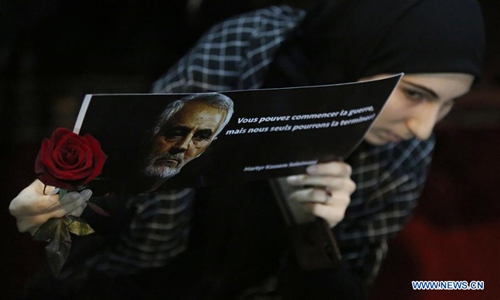HOME >> OPINION
With Soleimani’s killing, US ups stakes in Middle East
By Wang Lincong Source:Global Times Published: 2020/1/7 19:13:40

A supporter holds a portrait of Qassem Soleimani during a rally in southern suburbs of Beirut, Lebanon on Sunday. Photo: Xinhua/Bilal Jawich
In the past few days, conflicts between the US and Iran over the killing of Iranian military commander Qassem Soleimani continue to escalate rapidly and have reached the brink of full confrontation.Currently, the biggest concern of the whole world is whether the tensions between Iran and the US will go out of control.
Some experts take the mutual retaliation as a prelude to war. Although neither Iran nor the US would like to take the initiative to start a war, the likelihood of local clashes turning into war still cannot be ruled out.
There are two reasons why US President Donald Trump took such extreme actions as assassinating an Iranian high-ranking military official.
First, the US is trying to continue suppressing Iran's influence in the Middle East, especially in Iraq. The assassination can be seen as reckoning for its previous setbacks in the region. But the US may hardly get what it wants through this kind of action.
Not only are Iran and Iraq close geographically, they are also bonded religiously and politically. About 60 to 70 percent of the population in Iraq are Shia Muslims, and Iraq's Popular Mobilization Forces are tightly related to Iran.
Therefore, Iran's influence on Iraq is all-round. It is basically impossible for the US to remove Iran's influence out of this region completely.
Second, Trump intended to divert domestic attention. Currently, Trump is facing impeachment as well as harsh criticisms for improper handling of the Korean and Iranian nuclear issues. By eliminating an Iranian high-profile military official, Trump can show how tough he is.
However, Trump is now facing more criticism from the US because of his impulsive decision. The assassination of Soleimani has exposed the US to greater danger. As the US military has stepped up security of its forces in the Gulf region, particularly in Iraq, and heightened alert amid threats from Iran, the actual effect of the assassination was far from what it was intended to be.
On the surface, Trump's Middle East policy aims to strategically withdraw from the Middle East, but actually the US has gone deeper into the mire in the region. Trump did not fulfill his goal of a pullout from the Middle East, but has sent more forces there and risks being dragged into war.
Iran's revenge is expected. What the US did will have a profound impact on its relations with Iran. The deterioration of bilateral relations and the escalation of their confrontation have already become irreversible.
So far, except Israel, other Middle Eastern countries have shown a cautious attitude toward the feud between US and Iran, which indicates it is highly likely that the killing may evolve into war. The delicate balance between US maximum pressure and Iran's ultimate resistance may be broken due to the incident.
As one of the US most important allies in the Middle East, Israel sides with the US. But it also worries that it will be heavily affected if the situation gets worse, which is a reason why Israeli Prime Minister Benjamin Netanyahu quickly cut his Greece visit short and returned to Israel.
In this conflict between Iran and the US, Israel probably provided assistance. However in the meantime, it should guard against potential attacks from Syria and Lebanon and not underestimate Iran's influence in the Middle East.
The author is a research fellow with the Institute of West-Asian and African Studies, Chinese Academy of Social Sciences. opinion@globaltimes.com.cn
Posted in: VIEWPOINT